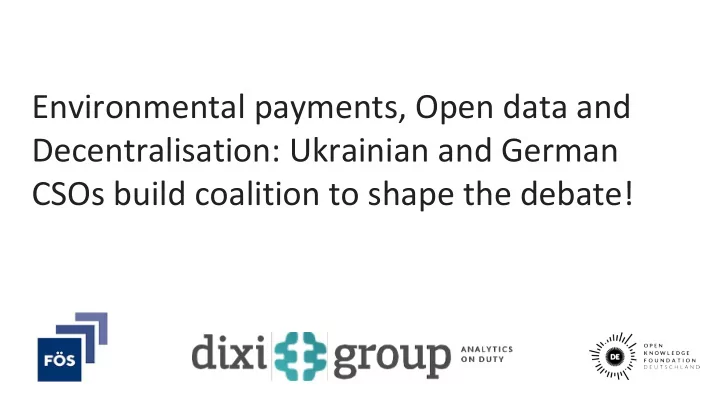

Environmental payments, Open data and Decentralisation: Ukrainian and German CSOs build coalition to shape the debate!
3 Parts: ● Environmental payments and EITI. Who pays the bill of extractive projects? Key issues are subsidies granted to extractive companies, securing of environmental rehabilitation costs and compensation payments. ● Inclusion of local stakeholders into EITI. How to work with civil society. ● Open data and EITI.
3 key issues: ● Beneficial Ownership ● Transparency Register ● Crossborder and subsidiary (.UA <-> .DE)
OGP 2nd national action plan
EITI Open Data Build Trust to automatic roll-out with from manual data open data and open standards work
Environmental payments Who pays the bill for extractive projects? ● Contribution to state revenues through taxes and fees are the benefits, but at what cost? ● Water and air pollution, greenhouse gases of fossil fuels ○ To which extent do extractive companies pay for these costs (i.e. are costs internalized)? ■ In Germany environmental costs are partly internalised: water fees, royalties, compensation measures (and payments), obligation to rehabilitate the sites when mines are shut down ■ But: extent of internalisation not sufficient, many exemptions
Environmental payments: water fees and royalties Who pays the bill for extractive projects? ■ Most Federal States levy consumption-related fees for the use of ground and surface water. But fee level is rather low and several exemptions for extractive (and other) water users ■ Royalties: vary greatly between German states and mining activity. High rates on oil and gas in Lower Saxony and Schleswig-Holstein, no royalties for lignite and hard coal.
Environmental payments: financial provisions for rehabilitation of sites Who pays the bill for extractive projects? ■ Companies are also obliged to create and maintain long-term accounting provisions (‘financing provisions’) for recultivation of the sites. ■ Provisions made by companies which must publish their annual financial statements are shown transparently at http://www.bundesanzeiger.de ■ Authorities can ask for other implementation securities (i.e. cash, payment to a fund etc.) to ensure that rehabilitation costs are covered even in case of insolvency, but they rarely do. This is especially important for lignite extraction (coal-phase out in Germany by 2038).
Environmental harmful subisidies Who pays the bill for extractive projects? ■ Hard coal mining has been subsidized over decades in Germany, because it was not competitive. At the end of 2018, the last hard coal mine was shut down. ■ Still other energy subsidies are relevant for extractive sector, e.g. tax relief for fossil fuels and (fossil-dominated) electricity used in the sector. ■ EITI validation: “The EITI Report showed that in 2016 subsidies to the coal sector totalled nearly EUR1.3 billion. In the same year, total gross government revenue from the extractive sector was less than EUR500 million”. https://eiti.org/news/germany-eiti-leads-by-example
Dixie
THE EXTRACTION TRANSPARENCY LAW • BEYOND THE EU DIRECTIVES • PROJECT BY PROJECT REPORTING • REPORTING OF STATE AID, • SOCIAL PROJECTS, LABOR FORCE
Transparency and rent decentralization strengthen local communities in Ukraine According to the Law, 95% of the rental fee comes to the state budget, while 5% is distributed between local budgets of different levels.
Recommend
More recommend